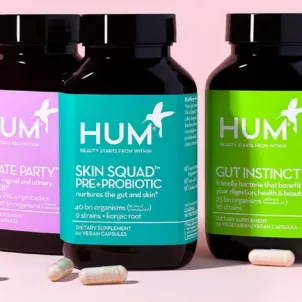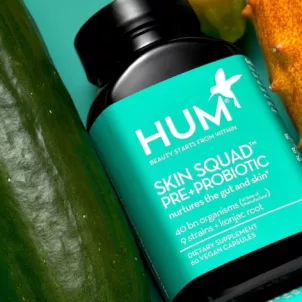What’s the deal with probiotics for skin? Here, we’ll uncover the benefits of probiotic skincare and fermented ingredients in both topical and supplement forms.
If probiotics had a motto, it very well could be “in with the good, out with the bad.” Of course, we’re talking about good and bad bacteria—and probiotics are one of the best allies to yield major benefits for your gut, skin, and overall health.
You may be familiar with oral probiotics, but fermented ingredients and probiotic skincare are also having a moment—and rightfully so. But how exactly do these good bacteria help your skin from the outside in, and is it worth trying out for your own unique concerns?
Find out by taking a closer look at the benefits of probiotics for skin and how to find the best solution for your needs.
What Is Probiotic Skincare?
Probiotic skincare exists in a few forms—including topical products and oral supplements—to produce benefits for your skin.
Probiotics are beneficial for your skin microbiome (when applied topically) and gut microbiome (when ingested, which then creates a domino effect to support your skin, immunity, mood, and more) because they help to balance bacteria. For a quick refresher, a microbiome is a collection of all microorganisms—bacteria, fungi, viruses, etc.—that coexist in a specific environment.
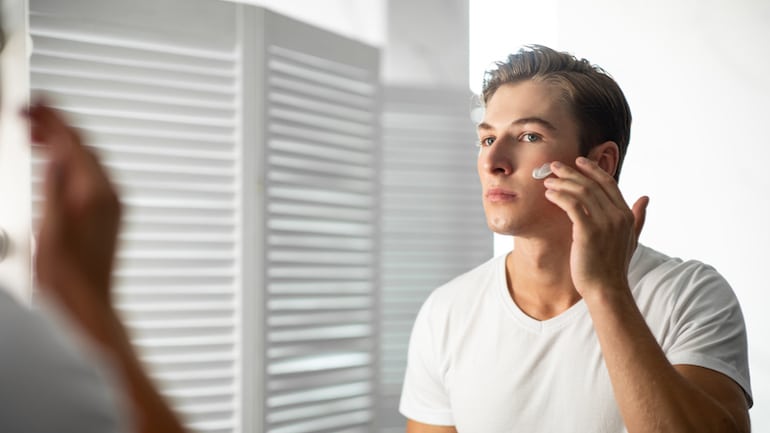
Topical Probiotics and Fermented Ingredients in Skincare
Fermented ingredients are beneficial for your skin for several reasons.
“Topically applied probiotics help to restore your skin’s microflora, which also helps to regulate inflammation on your skin,” begins Jennifer Martin-Biggers, HUM’s VP of Scientific Affairs and Education. “Your skin naturally has many beneficial bacteria. The pH level they prefer is around 5, but some soaps or harsh skincare products have a high amount of alkalinity that can disrupt the natural environment for a good skin microbiome.”
For starters, the fermentation process breaks down the composition of ingredients (such as vitamins, minerals, and amino acids) into smaller molecules, which your skin can more readily absorb. The process also heightens the concentration of active ingredients to maximize their efficacy.
In addition to products with live probiotic strains, fermented ingredients in skincare include but aren’t limited to:
- lactic acid (fermented milk)
- kombucha (fermented black tea)
- amino acids and peptides (fermented yeast extract)
- sake (fermented rice)
From there, you can find such topical ingredients in skincare products like:
- cleansers
- toners
- moisturizers
- masks
Dietary Probiotics
Meanwhile, there are dietary supplements that include strains with clinically backed benefits for skin, which we’ll take a closer look at below.
You can also integrate good bacteria into your diet via fermented foods and drinks, such as:
- sauerkraut
- kimchi
- kefir
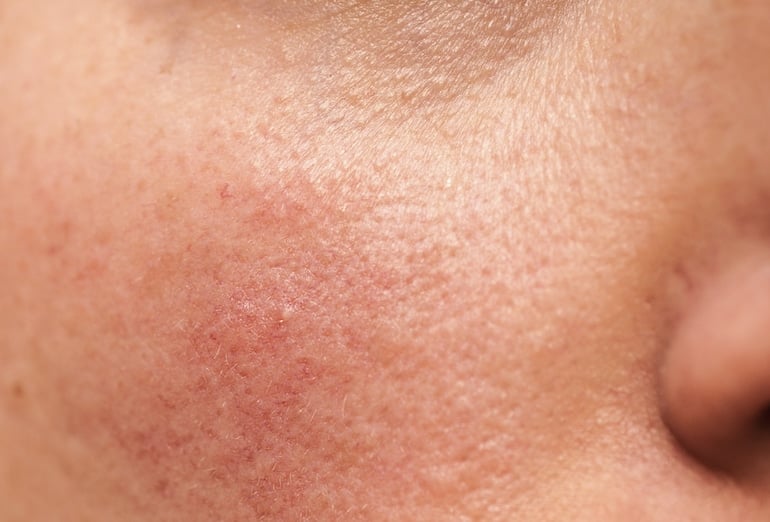
Benefits of Probiotics for Skin
Probiotics can benefit your skin in a number of ways to address a range of concerns. Here’s a closer look at the biggest wins you can expect by following a probiotic skincare regimen.
1. Probiotics Help Reduce Acne and Inflammation
When it comes to your complexion, probiotics are best known for their ability to promote clear skin.
A range of factors can cause or exacerbate acne, which can lead to the proliferation of P. acnes bacteria in the skin’s microbiome. Research shows that topical application of the probiotic strain Streptococcus thermophiles can increase ceramide production and yield antibacterial effects that inhibit the production of P. acnes, resulting in fewer breakouts.
Oral probiotic supplements also support clear skin by positively impacting gut flora. When intestinal barriers are disturbed, bad bacteria can enter the bloodstream and disrupt skin homeostasis, which may manifest in the form of breakouts and changes in skin texture and tone.
Fortunately, gut-friendly probiotics support skin allostasis (the process by which homeostasis is restored) to mitigate inflammatory conditions like acne and generally support a healthy complexion.
2. Probiotics Support Skin Barrier Function
Probiotics positively impact the skin barrier, the outer protective layer of the epidermis that retains water and minerals while keeping out bad bacteria and other toxins.
Again, skin barrier function is compromised by using harsh, alkaline products—including some that are formulated to reduce acne. (A healthy skin microbiome has an average pH level of 4.5 to 5.0, which is slightly acidic, while topical acne treatments often clock in significantly higher.) Aggressive exfoliation and certain medications can also weaken skin barrier function. Martin-Biggers adds that stress, diet, and other lifestyle factors contribute to your skin microbiome balance as well.
Again, several studies show that topical probiotics can enhance skin barrier function via antimicrobial properties and by increasing ceramide production. Ceramides are an essential component of the skin barrier, serving as a glue of sorts to hold healthy skin cells together. They provide healthy fats to the skin to restore skin barrier function, which in turn promotes a replenished, clear complexion.
3. Probiotics Protect Skin from Premature Aging and Damage
As we saw above, the skin microbiome requires an acidic (versus alkaline) pH to thrive. As it turns out, the skin’s pH rises with age through the stimulation of protease activity. “Proteases break down proteins,” Martin-Biggers explains. “One protease, called elastase, actually breaks down elastin in your skin which, alongside collagen, helps form the structure of your skin. As they’re broken down, skin is less firm, elastic, and prone to forming wrinkles.” Since probiotics promote an optimal acidic environment, they naturally help balance the skin’s pH and work to normalize protease activity akin to that of bouncy, healthy skin.
In addition, an excess of free radicals causes oxidative stress, which accelerates aging and other forms of damage in your skin and body alike. Fortunately, studies show that oral supplementation of certain Lactobacillus strains may help slow skin aging by boosting the efficacy of free radical scavengers and limiting free radical production.
This feature not only protects against UV damage and wrinkles, but also the physical side effects of environmental stress and pollution, such as dehydrated skin.
Should You Use Topical or Oral Probiotic Skincare?
If you want to reduce breakouts, fortify your complexion, and/or mitigate signs of premature aging, probiotic skincare can be well worth the investment.
As for whether to go the topical probiotic or supplement route? If your digestion is off and you experience forms of GI distress, an oral probiotic supplement can work double duty to simultaneously balance your gut and skin.
However, it bears repeating that diversity is the name of the game when it comes to probiotics, so you may choose to consider both forms. After all, as we saw above, the benefits of probiotics for skin aren’t limited to one method over the other. Yet as with any addition to your skincare routine, it’s best to integrate one new product at a time—ideally allowing for a consistent, monthlong integration—to accurately assess results.
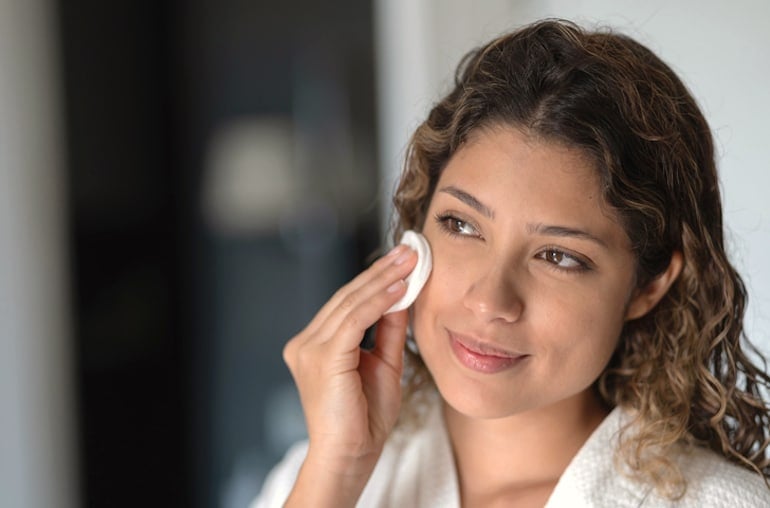
What Are the Best Probiotics for Skin?
“Lactobacillus and Bifidobacterium are two of the most commonly used probiotic species for skin health,” Martin-Bigger shares. “They appear to have an effect through mediating skin inflammation, providing their benefits.”
Several studies show that these types of probiotics are particularly beneficial for inflammatory gut and/or skin conditions via oral supplementation. (Tip: To go the extra mile, look for formulations that also include prebiotics, which fuel the potency of probiotics.)
Fortunately, most high-quality probiotics for skin and overall health will include an assortment of species and strains to promote microbiome diversity and allow good bacteria to thrive.
The Best Topical Probiotic and Fermented Skincare Products
Lastly, if you’re looking to add topical probiotics and fermented ingredients to your skincare routine, you have a range of options to choose from.
For a nourishing yet deep clean, check out the Greek Yoghurt Foaming Cream Cleanser from Korres ($26). Prebiotic/probiotic Greek yogurt soothes redness, combats dryness, and gives inflamed skin the TLC it craves.
For acne-prone skin, I recommend the Eminence Organic Clear Skin Probiotic Cleanser ($42). It contains two plant-based alternatives for popular breakout-fighters—willow bark extract (similar to the BHA salicylic acid) and tea tree oil (a great anti-bacterial dupe for benzoyl peroxide)—as well as fermented milk in the form of lactic acid, a nourishing chemical exfoliant.
To strengthen skin barrier function, opt for a soothing yet potent treatment like We Come in Peace Probiotic Serum from Good Light ($24). It contains Lactococcus Ferment Lysate to help regulate your skin microbiome, as well as a host of antioxidants and anti-inflammatory actives.
Finally, to clear pores, minimize dark spots, and revitalize your complexion, try out Youth to the People’s Kombucha + 11% AHA Exfoliation Toner ($38). Kombucha offers skin-boosting prebiotic prowess, Pichia Lysate Ferment protects your skin from oxidative stress, and lactic acid gently combats dullness.
